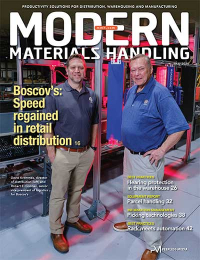XPO takes next steps for spin-off of its North American truck brokerage business.
Latest Material Handling News
Greenwich, Conn.-based freight transportation services provider XPO Logistics said earlier today that it has filed a confidential Form 10 registration statement with the United States Securities and Exchange Commission (SEC), regarding the planned spin-off of the company’s North American truck brokerage business. XPO officials said that the spin-off is expected to be completed during the fourth quarter.
In early April, when XPO first rolled out its plans to spin off its North American truck brokerage from its less-than-truckload business, as well as its related asset-light businesses, XPO said that the objective of this spin-off is to “unlock value” for its stakeholders. And it added that it will create two focused, publicly-traded companies at the top of their industries.
XPO said that its truck brokerage business represents the largest component of the spin-off, through its complementary brokered services for managed transportation, last mile logistics, and global forwarding, which collectively make up XPO’s North American Transportation division, which is led by Drew Wilkerson, whom will serve as CEO for the spin-off.
XPO also announced that Lou Amo, president, XPO, North America, has been named as president, truck brokerage, for the spin-off. Amo joined XPO as vice president, brokerage operations in 2012 and was promoted to president, truck brokerage—North America in 2020. And, from 2016 to 2020, his role was expanded to include executive responsibility for expedite and managed transportation.
“Drew and Lou have built a cohesive management team that has outperformed the brokerage industry for years, in large part through technology,” said Brad Jacobs, chairman and chief executive officer of XPO Logistics, in a statement. “Our spin-off is intended to create significantly more value for customers and investors as a standalone pure-play with a high-performing model.”
An XPO spokesperson told LM earlier this year that these moves will transition one great company into two great companies.
“We learned from the GXO spin that when you have companies that are more focused and fit for purpose with a management team doing one thing, you can drive outsized growth,” she said. “There's a large universe of investors who want to invest in a pure-play like the third-largest LTL provider in North America that's asset-based with a high return on capital and levered to the industrial recovery. We’ve managed the business very well, generating over $3 billion in cash since we bought the business, and it’s going to be even more focused post-spin, with significant upside potential. There's also a separate and distinct universe of investors who want to invest in an asset-light, tech-enabled truck brokerage platform that the spin-off will be. Our best-in-class truck brokerage business has first-mover tech advantage and grew at three times the rate of the industry from 2013 to 2021.”
Evan Armstrong, president of Milwaukee-based supply chain consultancy Armstrong & Associates, told LM that XPO finally making its LTL carrier operations a standalone company should have been done right after its acquisition of Con-way in 2015, saying there were very few synergies between a traditional LTL carrier and the 3PL operations, whereas this move makes sense.
But, from a 3PL perspective, he said that the company’s strategy does not make sense, for a few different reasons.
“With the carve out of GXO and now the breakup of its transportation management operations and severance of intermodal rail services, it looks like XPO is trying to increase its competition from smaller third-party logistics providers (3PLs) with less-integrated service offerings,” he said. “While shippers are trying to reduce the number of 3PLs they work with globally, XPO’s strategy continues to be counterintuitive. This new siloed approach limits XPO’s ability to cross-sell services and compete with leading 3PLs having extensive service offerings, and opens it up to increased competition from the larger number of 3PLs playing in individual market segments.”
XPO set a new company record, for first quarter earnings, which were issued last month.
Quarterly revenue—at $3.47 billion—increased 16% annually an 41% compared to the first quarter of 2020, representing the fifth straight quarter XPO’s revenue has set a new record. EBITDA—at $321 million—also set a new record, while posting a 15% annual gain (full-year 2022 EBITDA guidance issued by XPO now stands at $1.35 billion-to-$1.39 billion), and adjusted earnings per share—at $1.25—marked the highest for any first quarter in company history, topping Wall Street estimates, at $0.93. Operating income—at $625 million—was up 22%. XPO said that quarterly revenue included the recent sale of its intermodal business to STG Logistics.
Brokerage and other services revenue, at $2.432 billion, was up 38% annually, with XPO pointing to the gain being driven by a significant increase in North American truck brokerage loads, facilitated by its XPO Connect digital platform and also strength in other truck brokerage services. And North American less-than-truckload (LTL) revenue, at $1.1 billion, was up 15% annually, with XPO saying that the gain represented an increase in yield, while operating income, at $132 million, off 9%, and yield, excluding fuel, saw a 9% increase.

Article Topics
News & Resources
Latest in Materials Handling
11th annual National Forklift Safety Day to be hybrid event, on June 11 PAC Machinery announces leadership transition Motion Industries to acquire automation company Automate 2024 heavy on smart warehouse robotics Lift Trucks & Accesories: The Trusted Workhorse Evolves Automate & Accelerate: Replacing Pick-to-Light with the Next Generation of Automation 6 Ways to Re-evalute Fulfillment This Year More Materials HandlingAbout the Author
Subscribe to Materials Handling Magazine

Find out what the world's most innovative companies are doing to improve productivity in their plants and distribution centers.
Start your FREE subscription today.
May 2024 Modern Materials Handling

Latest Resources










